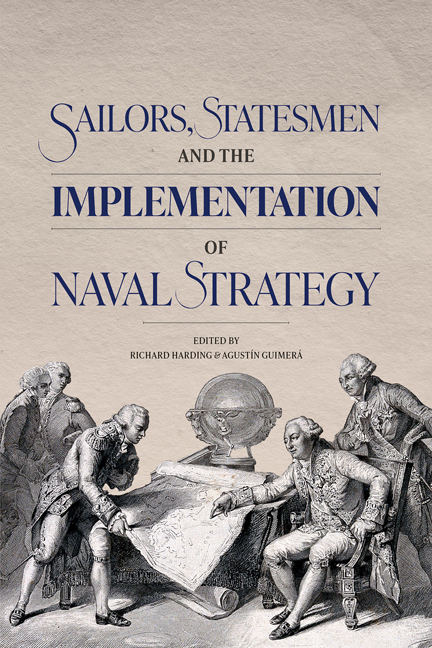Book contents
- Frontmatter
- Dedication
- Contents
- List of Contributors
- Introduction: Naval Leadership: Expertise and Strategy
- 1 The Evolution of French Naval Leadership: Defining the Admiralty of France from the Sixteenth to the Eighteenth Century
- 2 The Makers of Spanish Naval Strategy in the Eighteenth Century: Strategy, Tactics, and Shipbuilding Policy
- 3 Naval Strategic Leadership in Britain, 1739–1748: Political Leaders and Professional Knowledge
- 4 The Statesman and the Naval Leader: The Count of Floridablanca and Navy Minister Antonio Valdés, 1783–1792
- 5 Defining French Eighteenth-Century Naval Strategy
- 6 Casto Méndez Núñez: The Admiral who could have been Regent, 1861–1868
- 7 Teaching by Example: Julian Corbett’s The Campaign of Trafalgar of 1910
- 8 Spanish Naval Leadership during the Second Republic: José Giral Pereira
- 9 The Quest to Understand Naval Leadership: Educating Admirals for High Command in the U.S. Navy from the Eighteenth Century into the Twenty-first Century
- 10 Reflections
- Bibliography
- Index
6 - Casto Méndez Núñez: The Admiral who could have been Regent, 1861–1868
Published online by Cambridge University Press: 08 May 2024
- Frontmatter
- Dedication
- Contents
- List of Contributors
- Introduction: Naval Leadership: Expertise and Strategy
- 1 The Evolution of French Naval Leadership: Defining the Admiralty of France from the Sixteenth to the Eighteenth Century
- 2 The Makers of Spanish Naval Strategy in the Eighteenth Century: Strategy, Tactics, and Shipbuilding Policy
- 3 Naval Strategic Leadership in Britain, 1739–1748: Political Leaders and Professional Knowledge
- 4 The Statesman and the Naval Leader: The Count of Floridablanca and Navy Minister Antonio Valdés, 1783–1792
- 5 Defining French Eighteenth-Century Naval Strategy
- 6 Casto Méndez Núñez: The Admiral who could have been Regent, 1861–1868
- 7 Teaching by Example: Julian Corbett’s The Campaign of Trafalgar of 1910
- 8 Spanish Naval Leadership during the Second Republic: José Giral Pereira
- 9 The Quest to Understand Naval Leadership: Educating Admirals for High Command in the U.S. Navy from the Eighteenth Century into the Twenty-first Century
- 10 Reflections
- Bibliography
- Index
Summary
One of the greatest exemplars of personal leadership in the history of modern Spain was a naval officer, the son of a humble postal worker from Vigo, whose brilliant career would be acclaimed by contemporary literary figures such as Benito Pérez Galdós and Gustavo Adolfo Bécquer. His name and accomplishments would be commemorated in streets all over Spain, and he would even be proposed as Regent of the Kingdom after the 1868 revolution that deposed Isabel II (who, even so, remained steadfast in her affection for him). Méndez Núñez would never get a chance to play this role, however, because he succumbed to illness only a year later and died at just 45 years of age.
The Spanish navy has memorialized Méndez Núñez several times by naming ships after him: an armoured frigate (up to 1886), a light cruiser (1922–1963), a destroyer (1973–1992), and a new class F-100 frigate (2007–). Among the other ships in this last class, some are named after such illustrious seafarers as Christopher Columbus, Álvaro de Bazán, and Blas de Lezo. Thus, despite ever-shifting political winds, Méndez Núñez's name has continued to be celebrated almost without interruption from the time of his death until the present, a period of almost 150 years.
It is true that Méndez Núñez did not discover a new world or win any decisive battles like Lepanto, Ponta Delgada, or Cartagena de Indias, but his prominence transcends his naval accomplishments, and he has come to be considered a paragon of good character, personifying what it means to be a Spanish patriot.
Born in Vigo on 1June 1824, Méndez Núñez joined the navy as a midshipman before the age of sixteen and was promoted to sub-lieutenant on 11 June 1846, thus rising to an officer's rank more quickly than he ought to have. This was due to his outstanding service in the reconnaissance expedition to Equatorial Guinea aboard the brigantine Nervión, which earned him his first decoration: the Fernando Poo Cross. Later, serving in Spain's expedition in support of Pope Pius IX, he earned the Pontifical Cross and the Pontifical Medal.
- Type
- Chapter
- Information
- Sailors, Statesmen and the Implementation of Naval Strategy , pp. 104 - 119Publisher: Boydell & BrewerPrint publication year: 2024

